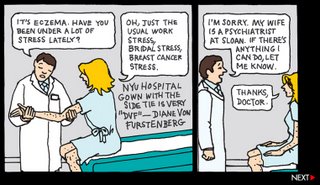
Last night I watched this rather bizarre arthouse film from Director Del Toro. The film portrays the escapism of a young girl in the midst of the Spanish Civil War: her father, a tailor, is dead. Her mother is expecting the child of an Army Captain (for whom the tailor once worked). Mother and daughter travel to the Captain's outpost - where skirmishes take place with local insurgents in the wooded hills - in order for the mother to give birth with the father present (he eagerly awaits the birth of the son he is convinced he will have).
Nearby, there is an old labyrinth which the girl explores. Here, she meets a Faun who explains that she is in fact a Princess, and if she can complete three tasks before the full moon, she can open the last remaining portal to her kingdom.
***Spoiler alert***
The Captain is so driven that he ultimately sacrifices everything for his cause; the girl's mother dies in childbirth, he slays innocents in the woods, he horrendously tortures one of the rebels he finds.
Throughout all of this, he has a local doctor by his side, tending to his men, but more importantly to his wife, for whom pregnancy has not been easy. What the Captain doesn't know is that he is also working for the rebels, treating their injuries and supplying them with antibiotics.
This leads to the interesting insight into the role of the doctor, who ends up euthanatising the tortured rebel. When the Captain discovers this, he shoots the doctor. Of course, directly afterwards, his wife's condition deteriorates rapidly, and the paramedic has to be called, seeing as the doctor is dead.
The doctor appeared not to take sides; he treated all to the best of his ability - it was those who he was treating that expected a level of loyalty greater than he could provide. Obviously, the question of euthanasia is a debate by itself, but it brings into question the difficulties faced by military doctors today, with limited equipment and casualties on both sides requiring treatment. For this doctor, his compassion results in his own death, perhaps a noble option.
Sadly, in the end, the Captain's unfaltering obsession with his cause leads to the girl's death. She finds happiness in the fantasy world created from the dark surroundings in her final moments, but the futility strikes the viewer's emotions, as we realise that the Narnia-esque world we have been subject to was pure escapism, and nothing more. This film is depressing, sinister and almost certainly not for children as one might have imagined! However, I found it thought-provoking, and felt the Spanish language with accompanying subtitles helped to create an alien feeling of a blinkered version of reality.






